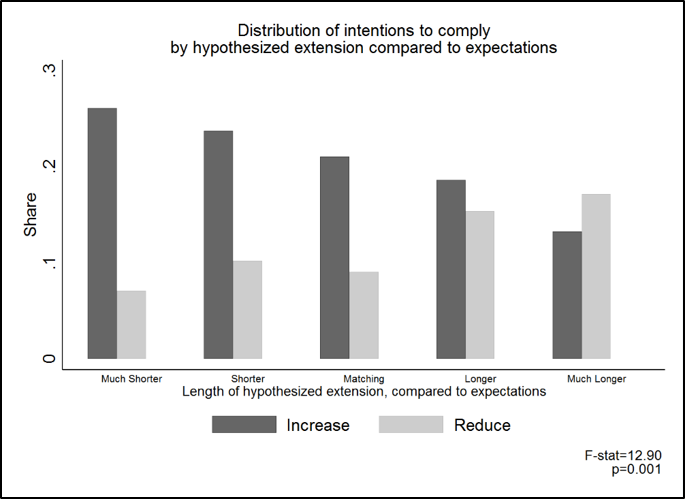
Social distancing measures have a central role in the strategy to fight the spread of Covid-19, and they are being implemented in an increasing number of countries. A key element for their success is to ensure that people comply with them. Compliance, however, cannot be taken for granted, as the economic and psychological costs associated with “stay-at-home” orders are substantial. While there may be some adaptation over time (e.g. with the introduction of online lectures by schools), it is reasonable to assume that these costs are increasing with the duration of restrictions. For these reasons, it is important to know people’s expectations about the duration of lockdown measures and whether these expectations will have an impact on compliance.
Italy, the country that so far has been the hardest hit by the pandemic in terms of deaths, provides the ideal laboratory for answering this question. After the emergence of the first cases of community transmission, the Italian government ordered school closures and stay-at-home measures in the affected areas and then extended them to the whole country. Authorities set April 3 as the end date of the stay-at-home measures. However, as the number of Covid-19 cases and deaths continued to climb, extensions of the end date became very likely. Indeed, the government announced an extension to April 13 on April 1 (with the explicit mention of possible further extensions).
We surveyed a representative sample of the population on March 18–20 about their beliefs on the duration of the lockdowns. The vast majority of people expected an extension. However, expectations about the length of the extension varied widely: 43% expected the measures to continue for a few additional weeks, 20% for a few months, and 34% indefinitely (“until necessary”).
Next, we asked respondents about their intentions to comply with the social distancing restrictions if the measures were extended (i) by a few weeks, (ii) a few months, or (iii) indefinitely. Most respondents indicated an intention to “maintain their current behavior,” regardless of the length of the extension. Moreover, more respondents reported that they would “increase” rather than “decrease” their self-isolation efforts.

But people’s intentions to comply depended on whether the length of the extension matched with their expectations (or not). Respondents who would be positively surprised (i.e. an extension shorter than they expected) expressed a greater willingness to increase their isolation efforts and a lesser intention of decreasing them compared to those who would be negatively surprised (i.e. extensions longer than expected). These results were mainly among respondents who are “fully compliant,” that is, those who had already adopted the recommended self-isolation measures. This finding is worrisome, because it is consistent with “social isolation fatigue” and suggests that the efforts of currently compliant individuals should not be taken for granted.
To maximize compliance with self-isolation, public authorities should make an effort to manage the public’s expectations about the duration of these measures. This is particularly challenging in the current environment in which, due to the novelty of the virus, there is a high degree of uncertainty about how long these measures would need to remain in place to be effective.
© Guglielmo Briscese, Nicola Lacetera, Mario Macis, and Mirco Tonin
Guglielmo Briscese is a Post-doctoral Fellow at the University of Chicago, USA
Nicola Lacetera is Associate Professor of Management, University of Toronto—Mississauga, Canada
Mario Macis is an Associate Professor at Johns Hopkins Carey Business School, USA
Mirco Tonin is Professor in Economic Policy, Vice Dean for Research, and Director of the Master in Public Policies and Administration at the Faculty of Economics and Management, Free University of Bozen-Bolzano, Italy
Read more on the coronavirus crisis:
"Coronavirus and the labor market," by Daniel S. Hamermesh
"Fighting a coronavirus recession," by Daniel S. Hamermesh
"Pandemics and the labor market—Then and now," by Karen Clay
"Pricing the lives saved by coronavirus policies," by W. Kip Viscusi
"Health effects of the coronavirus recession," by Christopher J. Ruhm
"The long-term consequences of missing a term of school," by Simon Burgess and Hans Sievertsen
"Coronavirus, telecommuting, and the labor market," by Nikos Askitas
Please note:
We recognize that IZA World of Labor articles may prompt discussion and possibly controversy. Opinion pieces, such as the one above, capture ideas and debates concisely, and anchor them with real-world examples. Opinions stated here do not necessarily reflect those of the IZA.